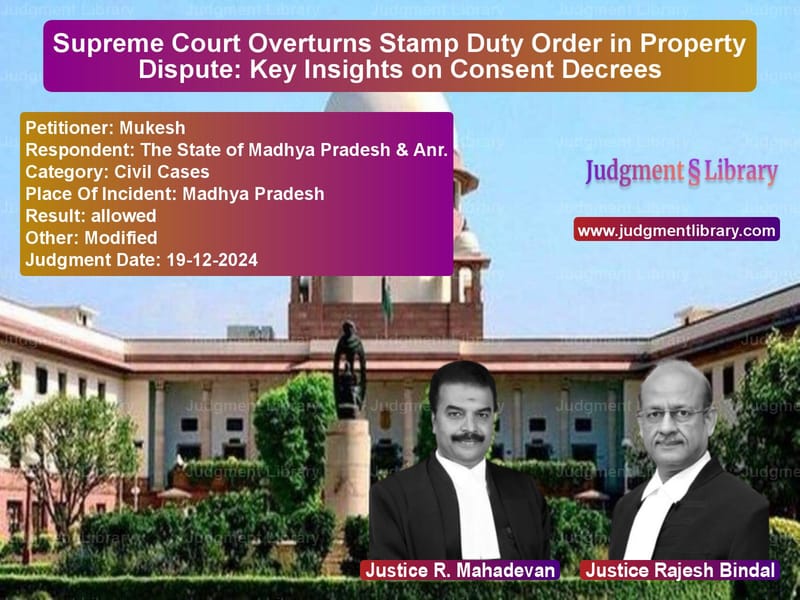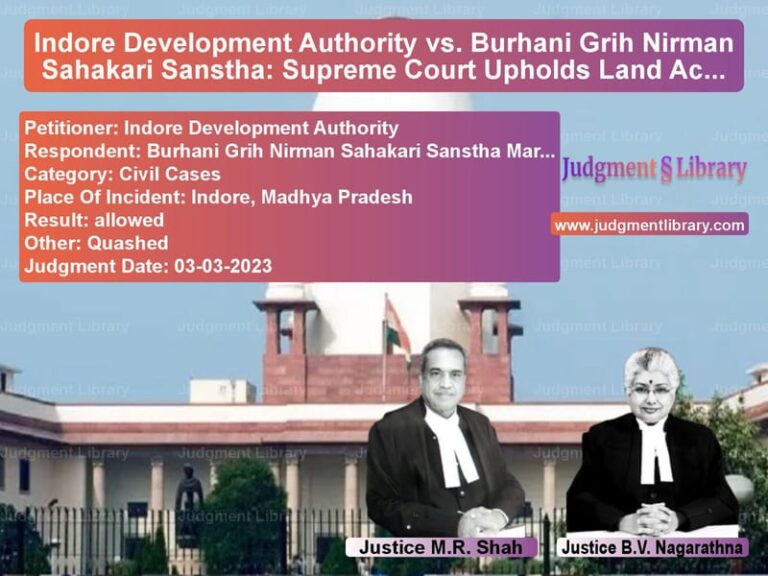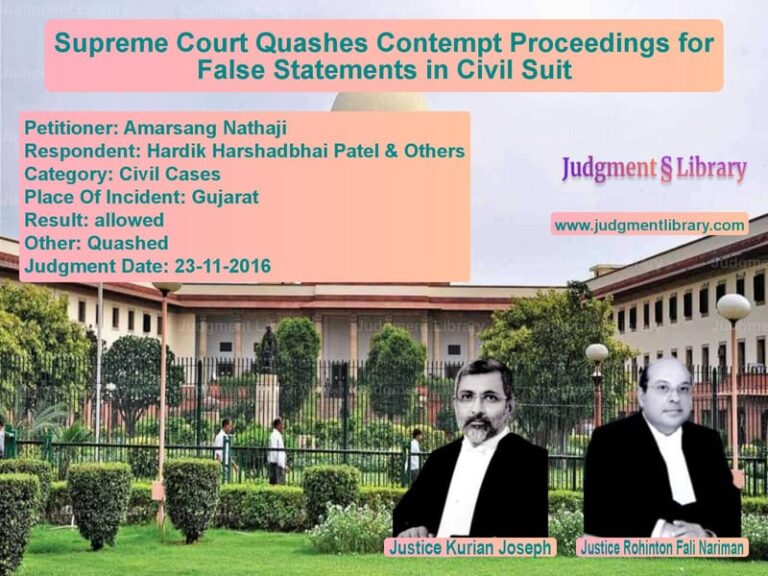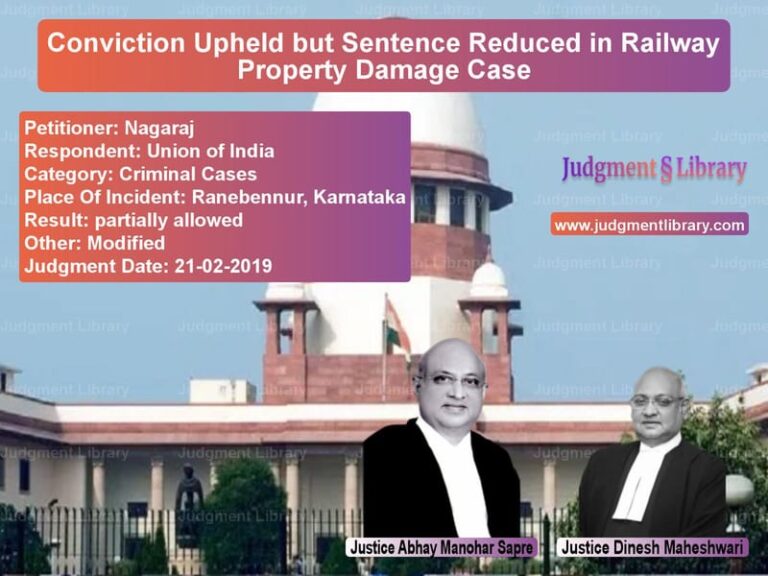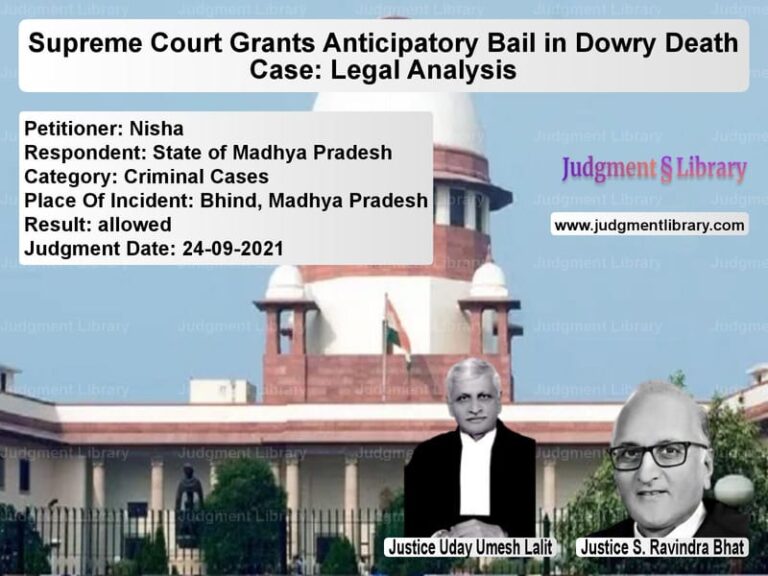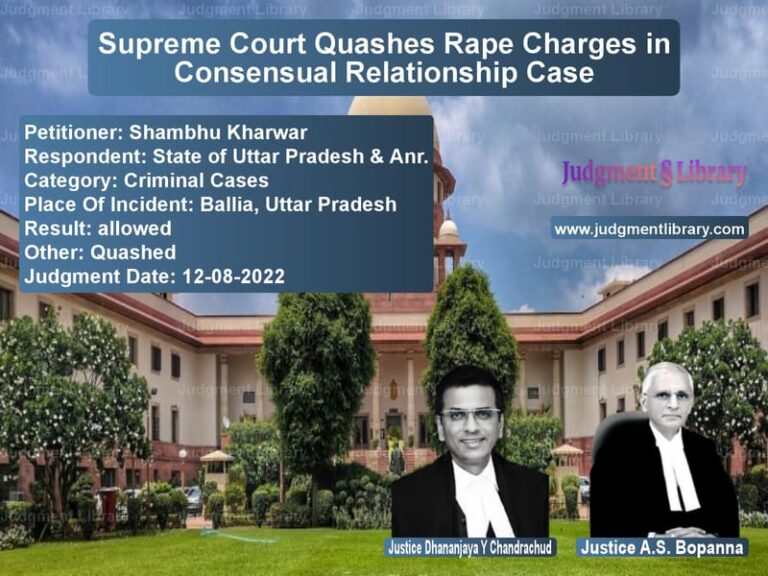Supreme Court Overturns Stamp Duty Order in Property Dispute: Key Insights on Consent Decrees
The Supreme Court of India, in the case of Mukesh vs. The State of Madhya Pradesh & Anr., delivered an important judgment on December 20, 2024, concerning the applicability of stamp duty and the registration of consent decrees involving immovable property. This case centers on whether a compromise decree regarding property possession, which asserts pre-existing rights, requires the payment of stamp duty under the Indian Stamp Act, 1899.
Background of the Case
The dispute arose from a property claim by Mukesh (the appellant) against Abhay Kumar (respondent no.2), the adjacent landowner, concerning land located in Survey Nos. 2087, 2088/9/1/1, measuring 0.076 Ares at Village Kheda, Tehsil Badnawar, District Dhar, Madhya Pradesh. In 2013, Mukesh filed a civil suit for declaration and permanent injunction to establish ownership and possession of the land after Abhay Kumar allegedly tried to sell it to third parties.
During the pendency of the suit, both parties entered into a compromise, resulting in a consent decree passed by the court on November 30, 2013. This decree allowed Mukesh to assert his possession and ownership of the property, and he was entitled to get his name recorded in the revenue records. However, the land transfer involved a dispute over stamp duty payments.
Legal Issue: Applicability of Stamp Duty on Consent Decree
The issue at hand was whether the consent decree, which merely affirmed Mukesh’s pre-existing rights, required stamp duty and registration. The Collector of Stamps, in 2016, assessed a stamp duty of Rs. 6,67,500 based on the market value of the land. This order was upheld by the Board of Revenue and the High Court of Madhya Pradesh, leading to Mukesh’s appeal before the Supreme Court.
Arguments Presented
Arguments by the Appellant
- The consent decree did not create any new right but merely asserted pre-existing ownership and possession.
- The Indian Stamp Act, 1899, and its provisions do not apply to the consent decree, as it does not transfer property or create new rights.
- In similar cases, this Court had previously held that consent decrees involving pre-existing rights do not require registration or stamp duty.
- Relying on the case of Mohd. Yusuf v. Rajkumar (2020), the appellant argued that a compromise decree does not create new rights and is not liable for stamp duty.
Arguments by the Respondent
- The respondent contended that the suit filed by the appellant sought to declare ownership based on adverse possession.
- The consent decree, entered after the suit, involved property rights over land that was not initially in the appellant’s name.
- The respondent argued that since the decree involved a transfer of property rights, stamp duty was applicable under the Indian Stamp Act, 1899, especially under Article 22A of Schedule 1A.
- The respondent further claimed that the compromise was intended to sidestep stamp duty requirements and that the appellant was, therefore, liable to pay the determined stamp duty for the transfer of land.
Supreme Court’s Observations
On the Nature of the Compromise Decree
The Supreme Court clarified that the compromise decree only affirmed the appellant’s pre-existing rights over the land, which he had held through continuous possession. The Court cited the case of Bhoop Singh v. Ram Singh Major (1995), which laid down that a compromise decree does not necessarily create new rights:
“A compromise decree that merely acknowledges pre-existing rights does not require registration and stamp duty. The decree is not a transfer of property rights but a formalization of the rights already vested in the claimant.”
On the Exemption from Stamp Duty
The Court noted that under Section 17 of the Registration Act, 1908, a compromise decree is exempt from registration if it relates to the subject matter of the suit. The Court observed:
“In the case at hand, the subject matter of the suit, which was the appellant’s long-standing possession and ownership of the land, was the same as the one covered by the compromise decree. Thus, there was no creation of new rights, and registration was not required.”
The Court further emphasized that the ruling in Mohd. Yusuf v. Rajkumar (2020) reaffirmed that a consent decree involving immovable property does not create new rights when it acknowledges pre-existing rights:
“When a decree simply acknowledges pre-existing possession, it does not create a fresh title to the property and therefore does not attract the requirement for registration or payment of stamp duty.”
Final Verdict
- The Supreme Court ruled in favor of the appellant and set aside the order of the High Court and the Collector of Stamps.
- The Court held that the consent decree did not require registration or payment of stamp duty as it merely asserted pre-existing rights and did not transfer any new rights.
- The Court directed that the revenue records should be amended to reflect the appellant’s name as the rightful owner of the land without the imposition of stamp duty.
Implications of the Judgment
- Protection of Pre-existing Rights: The judgment reinforces the principle that pre-existing rights, especially in property disputes, do not require fresh registration or stamp duty.
- Legal Precedent on Consent Decrees: This ruling clarifies the legal status of compromise decrees involving immovable property and their treatment under the Registration Act.
- Exemption from Stamp Duty: The ruling helps to protect individuals from being unfairly burdened with stamp duty when a decree simply affirms pre-existing rights.
- Encouragement for Settlement: The judgment promotes the use of consent decrees and alternative dispute resolution mechanisms as tools for resolving property disputes efficiently.
This ruling has wide implications for property disputes, especially those involving long-standing possession, and sets a strong precedent for how courts handle consent decrees related to immovable property.
Petitioner Name: Mukesh.Respondent Name: The State of Madhya Pradesh & Anr..Judgment By: Justice R. Mahadevan, Justice Rajesh Bindal.Place Of Incident: Madhya Pradesh.Judgment Date: 19-12-2024.
Don’t miss out on the full details! Download the complete judgment in PDF format below and gain valuable insights instantly!
Download Judgment: mukesh-vs-the-state-of-madhya-supreme-court-of-india-judgment-dated-19-12-2024.pdf
Directly Download Judgment: Directly download this Judgment
See all petitions in Property Disputes
See all petitions in Contract Disputes
See all petitions in Specific Performance
See all petitions in Judgment by R. Mahadevan
See all petitions in Judgment by Rajesh Bindal
See all petitions in allowed
See all petitions in Modified
See all petitions in supreme court of India judgments December 2024
See all petitions in 2024 judgments
See all posts in Civil Cases Category
See all allowed petitions in Civil Cases Category
See all Dismissed petitions in Civil Cases Category
See all partially allowed petitions in Civil Cases Category

